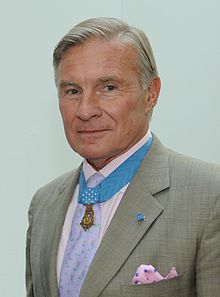Paul Bucha
Appearance

Captain Paul William Bucha (August 1, 1943 – July 31, 2024) was an American Vietnam War veteran and a recipient of the Medal of Honor. He was a foreign policy adviser to Barack Obama's 2008 presidential campaign.
Quotes
[edit]
- Leaders should be competent, professional, and have the absolute intestinal fortitude to use the last ounce in you to minimize the risk to the men and women in your command. I want this to be a reminder to each and every one of us, and every one of the men and women that you command, that we have the potential to do something extraordinary under certain circumstances. This is where this medal belongs, because this is where young men and women are learning to lead troops.
- From an address to the Corps of Cadets at the United States Military Academy at West Point in November 1997, when Bucha returned to his alma mater to donate his Medal of Honor. As quoted by Larry Smith in Beyond Glory (2003), p. 214-215
Beyond Glory (2003) interview
[edit]- So then we tried to use it as a platform to convince others to stop calling Medal of Honor men heroes, get rid of the word winner. Talk about recipients... Then, as president of the society in ninety-five, I tried to present it as a vehicle... We've received these medals on behalf of others. The important thing is to recognize that we are not special, and we are not different. We were just in a strange confluence of events, time and circumstance, where that which each of us has within us has emerged, both in those who wear the Medal and those who do not. So the important thing is to encourage respect for the potential that exist in people. Just as my men, who were written off by everybody, proved to be these fantastic, wonderful, legendary guys.
- p. 213
- It's not an academic institution. If you want to become academically polished and well read, go somewhere else. But we criticized it in our conceit- unfounded conceit, youthful arrogance, if you will. And West Point responded, and now it's trying to be an academic institution. And it's not. I think the cadets come to West Point to learn about a way of life. A life of being a leader based on the premise of honor. You can go serve your country anywhere. You don't need West Point just to serve the country. The academy must do something that enables service to country to be better performed here than anywhere else. West Point is leadership.
I'm lucky, and I have to say, bringing it circle, a lot of what I can do to day, what I have the ability to do, comes from the way I was taught at West Point. So I'm beholden to them, to the institution.- p. 213-214
Quotes about Bucha
[edit]- For conspicuous gallantry and intrepidity in action at the risk of his life above and beyond the call of duty. Capt. Bucha distinguished himself while serving as commanding officer, Company D, on a reconnaissance-in-force mission against enemy forces near Phuoc Vinh. The company was inserted by helicopter into the suspected enemy stronghold to locate and destroy the enemy. During this period Capt. Bucha aggressively and courageously led his men in the destruction of enemy fortifications and base areas and eliminated scattered resistance impeding the advance of the company. On 18 March while advancing to contact, the lead elements of the company became engaged by the heavy automatic-weapon, heavy machine-gun, rocket-propelled-grenade, claymore-mine and small-arms fire of an estimated battalion-size force. Capt. Bucha, with complete disregard for his safety, moved to the threatened area to direct the defense and ordered reinforcements to the aid of the lead element. Seeing that his men were pinned down by heavy machine-gun fire from a concealed bunker located some 40 meters to the front of the positions, Capt. Bucha crawled through the hail of fire to singlehandedly destroy the bunker with grenades. During this heroic action Capt. Bucha received a painful shrapnel wound. Returning to the perimeter, he observed that his unit could not hold its positions and repel the human wave assaults launched by the determined enemy. Capt. Bucha ordered the withdrawal of the unit elements and covered the withdrawal to positions of a company perimeter from which he could direct fire upon the charging enemy. When one friendly element retrieving casualties was ambushed and cut off from the perimeter, Capt. Bucha ordered them to feign death and he directed artillery fire around them. During the night Capt. Bucha moved throughout the position, distributing ammunition, providing encouragement, and insuring the integrity of the defense. He directed artillery, helicopter-gunship and Air Force-gunship fire on the enemy strong points and attacking forces, marking the positions with smoke grenades. Using flashlights in complete view of enemy snipers, he directed the medical evacuation of three air-ambulance loads of seriously wounded personnel and the helicopter supply of his company. At daybreak Capt. Bucha led a rescue party to recover the dead and wounded members of the ambushed element. During the period of intensive combat, Capt. Bucha, by his extraordinary heroism, inspirational example, outstanding leadership, and professional competence, led his company in the decimation of a superior enemy force which left 156 dead on the battlefield. His bravery and gallantry at the risk of his life are in the highest traditions of the military service. Capt. Bucha has reflected great credit on himself, his unit, and the U.S. Army.
- Citation for the Medal of Honor awarded to Bucha, presented by President Richard Nixon on 14 May 1970 at the White House, Washington, D.C.[1]

